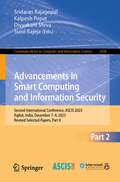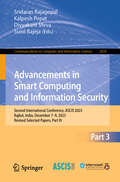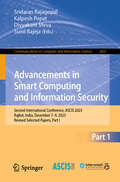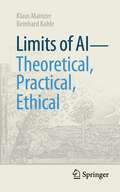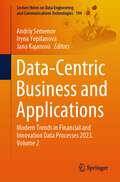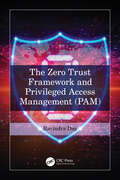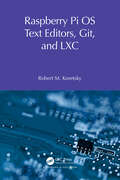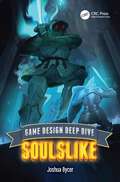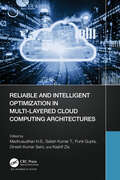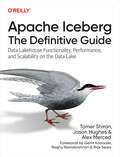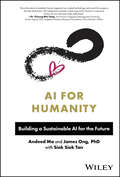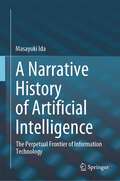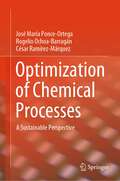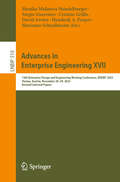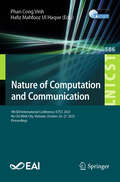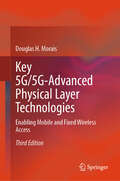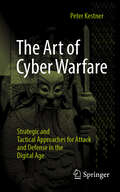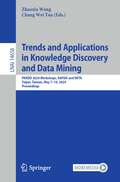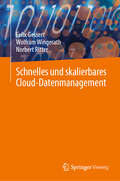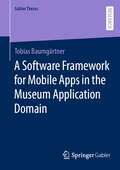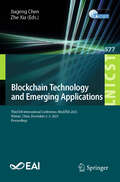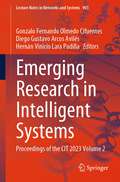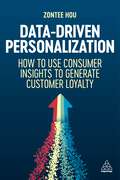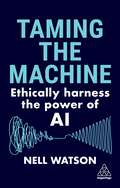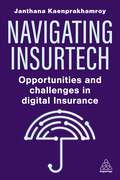- Table View
- List View
Advancements in Smart Computing and Information Security: Second International Conference, ASCIS 2023, Rajkot, India, December 7–9, 2023, Revised Selected Papers, Part II (Communications in Computer and Information Science #2038)
by Sridaran Rajagopal Kalpesh Popat Divyakant Meva Sunil BajejaThis 4-volume CCIS post-conference set represents the proceedings of the Second International Conference on Advances in Smart Computing and Information Security, ASCIS 2023, in Rajkot, Gujarat, India, December 2023. The 91 full papers and 36 short papers in the volume were carefully checked and selected from 432 submissions. Various application areas were presented at the conference, including healthcare, agriculture, automotive, construction and engineering, pharmaceuticals, cybercrime and sports.
Advancements in Smart Computing and Information Security: Second International Conference, ASCIS 2023, Rajkot, India, December 7–9, 2023, Revised Selected Papers, Part III (Communications in Computer and Information Science #2039)
by Sridaran Rajagopal Kalpesh Popat Divyakant Meva Sunil BajejaThis 4-volume CCIS post-conference set represents the proceedings of the Second International Conference on Advances in Smart Computing and Information Security, ASCIS 2023, in Rajkot, Gujarat, India, December 2023. The 91 full papers and 36 short papers in the volume were carefully checked and selected from 432 submissions. Various application areas were presented at the conference, including healthcare, agriculture, automotive, construction and engineering, pharmaceuticals, cybercrime and sports.
Advancements in Smart Computing and Information Security: Second International Conference, ASCIS 2023, Rajkot, India, December 7–9, 2023, Revised Selected Papers, Part I (Communications in Computer and Information Science #2037)
by Sridaran Rajagopal Kalpesh Popat Divyakant Meva Sunil BajejaThis 4-volume CCIS post-conference set represents the proceedings of the Second International Conference on Advances in Smart Computing and Information Security, ASCIS 2023, in Rajkot, Gujarat, India, December 2023. The 91 full papers and 36 short papers in the volume were carefully checked and selected from 432 submissions. Various application areas were presented at the conference, including healthcare, agriculture, automotive, construction and engineering, pharmaceuticals, cybercrime and sports.
Limits of AI - theoretical, practical, ethical (Technik im Fokus)
by Klaus Mainzer Reinhard KahleArtificial intelligence is a key technology with great expectations in science, industry, and everyday life. This book discusses both the perspectives and the limitations of this technology. This concerns the practical, theoretical, and conceptual challenges that AI has to face. In an early phase of symbolic AI, AI focused on formal programs (e.g., expert systems), in which rule-based knowledge was processed with the help of symbolic logic. Today, AI is dominated by statistics-based machine learning methods and Big Data. While this sub-symbolic AI is extremely successful (e.g., chatbots like ChatGPT), it is often not transparent. The book argues for explainable and reliable AI, in which the logical and mathematical foundations of AI-algorithms become understandable and verifiable.
Data-Centric Business and Applications: Modern Trends in Financial and Innovation Data Processes 2023. Volume 2 (Lecture Notes on Data Engineering and Communications Technologies #194)
by Andriy Semenov Iryna Yepifanova Jana KajanováThis book examines aspects of financial and investment processes, as well as the application of information technology mechanisms to business and industrial management, using the experience of the Ukrainian economy as an example. An effective tool for supporting business data processing is combining modern information technologies and the latest achievements in economic theory. The variety of industrial sectors studied supports the continuous acquisition and use of efficient business analysis in organizations. In addition, the book elaborates on multidisciplinary concepts, examples, and practices that can be useful for researching the evolution of developments in the field. Also, in this book, there is a description of analysis methods for making decisions in business, finance, and innovation management.
The Zero Trust Framework and Privileged Access Management (PAM)
by Ravindra DasThis book is about the Zero Trust Framework. Essentially, this is a methodology where the IT/Network Infrastructure of a business is segmented into smaller islands, each having its own lines of defense. This is primarily achieved through the use of Multifactor Authentication (MFA), where at least three more authentication layers are used, preferably being different from one another.Another key aspect of the Zero Trust Framework is known as Privileged Access Management (PAM). This is an area of Cybersecurity where the protection of superuser accounts, rights, and privileges must be protected at all costs from Cyberattackers. In this regard, this is where the Zero Trust Framework and PAM intertwine, especially in a Cloud-based platform, such as Microsoft Azure.However, as it has been reviewed in one of our previous books, the use of passwords is now becoming a nemesis, not only for individuals but for businesses as well. It is hoped that by combining the Zero Trust Framework with PAM, password use can be eradicated altogether, thus giving rise to a passwordless society.
Raspberry Pi OS Text Editors, git, and LXC: A Practical Approach (Raspberry Pi OS System Administration with systemd)
by Robert M KoretskyThe third volume in a new series exploring the basics of Raspberry Pi Operating System administration, this installment builds on the insights from Volumes 1 and 2 to provide a compendium of easy-to-use and essential guidance for Raspberry Pi system administration for novice users, with specific focus on Text Editors, git/ GitHub, and LXC/LXD.The overriding idea behind system administration of a modern, 21st-century Linux system, such as the Raspberry Pi OS, is the use of systemd to ensure that the Linux kernel works efficiently and effectively to provide these three foundation stones of computer operation and management: computer system concurrency, virtualization, and secure persistence. This third volume includes a beginner’s compendium of essential text-based Linux commands, a complete tutorial on the most important Raspberry Pi OS Text Editors, a description of uses of the git command, and a thorough explication of container virtualization with LXC/LXD and Docker.This book is aimed at students and practitioners looking to maximize their use of the Raspberry Pi OS. With plenty of practical examples, projects, and exercises, this volume can also be adopted in a more formal learning environment to supplement and extend the basic knowledge of a Linux operating system.
Game Design Deep Dive: Soulslike
by Joshua BycerGame Design Critic Joshua Bycer is back with another entry in the Game Design Deep Series to focus on the youngest genre yet: soulslikes. Over a decade, From Software defined a new genre that has led to studios chasing after them hit after hit. In this book, Josh will cover the history of the genre and popular soulslike games of the 2010s and discuss what aspects of design make a game a soulslike. The first book looking at the history of the genre A breakdown of both action and RPG design for fans and designers of both A lesson on difficulty in games and why harder doesn’t mean better
Reliable and Intelligent Optimization in Multi-Layered Cloud Computing Architectures
by Madhusudhan H. S. Satish Kumar T. Punit Gupta Dinesh Kumar Saini Kashif ZiaOne of the major developments in the computing field has been cloud computing, which enables users to do complicated computations that local devices are unable to handle. The computing power and flexibility that have made the cloud so popular do not come without challenges. It is particularly challenging to decide which resources to use, even when they have the same configuration but different levels of performance because of the variable structure of the available resources. Cloud data centers can host millions of virtual machines, and where to locate these machines in the cloud is a difficult problem. Additionally, fulfilling optimization needs is a complex problem.Reliable and Intelligent Optimization in Multi-Layered Cloud Computing Architectures examines ways to meet these challenges. It discusses virtual machine placement techniques and task scheduling techniques that optimize resource utilization and minimize energy consumption of cloud data centers. Placement techniques presented can provide an optimal solution to the optimization problem using multiple objectives. The book focuses on basic design principles and analysis of virtual machine placement techniques and task allocation techniques. It also looks at virtual machine placement techniques that can improve quality-of-service (QoS) in service-oriented architecture (SOA) computing. The aims of virtual machine placement include minimizing energy usage, network traffic, economical cost, maximizing performance, and maximizing resource utilization. Other highlights of the book include: Improving QoS and resource efficiency Fault-tolerant and reliable resource optimization models A reactive fault tolerance method using checkpointing restart Cost and network-aware metaheuristics. Virtual machine scheduling and placement Electricity consumption in cloud data centers Written by leading experts and researchers, this book provides insights and techniques to those dedicated to improving cloud computing and its services.
Apache Iceberg: The Definitive Guide
by Tomer Shiran Jason Hughes Alex MercedTraditional data architecture patterns are severely limited. To use these patterns, you have to ETL data into each tool—a cost-prohibitive process for making warehouse features available to all of your data. The lack of flexibility with these patterns requires you to lock into a set of priority tools and formats, which creates data silos and data drift. This practical book shows you a better way.Apache Iceberg provides the capabilities, performance, scalability, and savings that fulfill the promise of an open data lakehouse. By following the lessons in this book, you'll be able to achieve interactive, batch, machine learning, and streaming analytics with this high-performance open source format. Authors Tomer Shiran, Jason Hughes, and Alex Merced from Dremio show you how to get started with Iceberg.With this book, you'll learn:The architecture of Apache Iceberg tablesWhat happens under the hood when you perform operations on Iceberg tablesHow to further optimize Apache Iceberg tables for maximum performanceHow to use Iceberg with popular data engines such as Apache Spark, Apache Flink, and DremioHow Apache Iceberg can be used in streaming and batch ingestionDiscover why Apache Iceberg is a foundational technology for implementing an open data lakehouse.
AI for Humanity: Building a Sustainable AI for the Future
by Andeed Ma James Ong Siok Siok TanCapture the value of cutting-edge AI while mitigating its most salient risks AI For Humanity: Building a Sustainable AI for the Future delivers an incisive and timely discussion of how to design, build, and implement cutting-edge AI in for-profit firms and other organizations in a responsible, sustainable, and ethical way. The book walks you through the three pillars of human-focused AI development—governance, technology, and commercialization—and dives deep into each one, showing you how to create AI products and services that better humanity and advance universally held values. You'll find methodologies and frameworks that mitigate against some of the most profound and unsettling risks of unchecked artificial intelligence development, and roadmaps to help you avoid the numerous pitfalls and traps awaiting unsuspecting companies, managers, and executives. You'll also discover: Real-world case studies, from companies including SAP, Huawei, and Tencent, demonstrating the actual dilemmas and questions firms face when developing and implementing this extraordinary tech Actionable commitments you can make to help ensure you and your company avoid the ethical and reputational risks associated with AI Strategies for AI product and service development consistent with sustainable growth Perfect for managers, executives, directors, and other business leaders with a stake in responsible artificial intelligence design, development, and implementation, AI For Humanity will also interest regulators, academics, thought leaders, and policy makers doing their best to capture AI's substantial potential value while mitigating its most serious risks.
A Narrative History of Artificial Intelligence: The Perpetual Frontier of Information Technology
by Masayuki IdaThis book addresses the history of artificial intelligence through the author’s experiences from the 1960s, when AI was a dream to give computers far more power than the progress for industrial technological advancement. The book starts from the AI pioneering days including what the author witnessed and impressed, then the episodes during AI boom of the 80s and 90s when the author was involved in ANSI X3J13 committee work as a principal member, translating Common Lisp books into Japanese, leading committee works in Japan for global standardization, and visiting MIT AI Lab for totally three years. The book points out that neural network research started in the 1980s, highlighting the DARPA report dated in 1988. The last episodes and thoughts include the experiences with business school students after the author moved from engineering school. The former half is from a view of an engineering mind and then the latter is based on how the author struggled with business-minded people to explain the core of AI. This book is suitable for anyone interested in the history of Artificial Intelligence. The content is easy to follow, even for readers without prior knowledge of AI. Experts will also find something new and thought-provoking.
Optimization of Chemical Processes: A Sustainable Perspective
by José María Ponce-Ortega Rogelio Ochoa-Barragán César Ramírez-MárquezThis textbook introduces readers to a comprehensive framework for the application of deterministic optimization strategies in the field of chemical processes, with a strong emphasis on sustainability.The book establishes a vital connection between fundamental deterministic optimization principles, optimization tools, and real-world application instances, all within the context of environmentally responsible practices. The approach put forth in this book is exceptionally versatile, allowing for the use of many optimization software and deterministic techniques.Contained in the book are many fundamental optimization concepts, encompassing linear programming, nonlinear programming, integer programming, and multi-objective optimization, all tailored to promote sustainable decision-making. Furthermore, the book provides practical examples illustrating the application of these techniques within sustainable chemical processes as tutorials.The textbook also explores the utilization of popular optimization software platforms such as GAMS, MATLAB, and Python, demonstrating how these tools can be leveraged for eco-friendly process optimization. Through this comprehensive framework, readers can not only acquire the skills needed to optimize a wide range of processes but also learn how to do so with sustainability at the forefront of their considerations. This approach streamlines the optimization process, eliminating unnecessary complications along the way and ensuring that environmental and ethical considerations are integral to the decision-making process.
Advances in Enterprise Engineering XVII: 13th Enterprise Design and Engineering Working Conference, EDEWC 2023, Vienna, Austria, November 28–29, 2023, Revised Selected Papers (Lecture Notes in Business Information Processing #510)
by Monika Malinova Mandelburger Sérgio Guerreiro Cristine Griffo David Aveiro Henderik A. Proper Marianne SchnellmannThis book constitutes the refereed proceedings of the 13th Enterprise Design and Engineering Working Conference on Advances in Enterprise Engineering XVII, EDEWC 2023, held in Vienna, Austria, during November 27–28, 2023. Enterprise design and engineering aims to take an integrative and engineering-oriented perspective to enterprise development management. As such, it considers enterprises as purposefully designed systems where all relevant aspects should be designed in coherence. The new scope of EDEWC reflects the rapid increase in digitization of enterprises in the last decade. This has resulted in a substantial change in the nature and structure of enterprises, which was the main focus of EDEWC 2023. The 5 full papers and 2 short papers included in this book were carefully reviewed and selected from 15 submissions.
Nature of Computation and Communication: 9th EAI International Conference, ICTCC 2023, Ho Chi Minh City, Vietnam, October 26-27, 2023, Proceedings (Lecture Notes of the Institute for Computer Sciences, Social Informatics and Telecommunications Engineering #586)
by Phan Cong Vinh Hafiz Mahfooz Ul HaqueThis book constitutes the refereed post-conference proceedings of the 9th International Conference on Nature of Computation and Communication, ICTCC 2023, held in Ho Chi Minh City, Vietnam, in October 2023. The 12 revised full papers presented were carefully selected from 30 submissions. The papers of ICTCC 2023 cover formal methods for self-adaptive systems and discuss natural approaches and techniques for natural computing systems and their applications.
Key 5G/5G-Advanced Physical Layer Technologies: Enabling Mobile and Fixed Wireless Access
by Douglas H. MoraisThis third edition of this text covers the key technologies associated with the physical transmission of data on 5G mobile systems. Following an updated overview of these technologies, the author provides a high-level description of 3GPP’s mobile communications standard (5G/5G-Advanced) and shows how the key technologies presented earlier facilitate the transmission of very high-speed user data and control data and can provide very low latency for use cases where this is important. In the final chapter, an updated overview and the physical layer aspects of 5G NR enabled Fixed Wireless Access (FWA) networks is presented. Material in the second edition addressed mainly the key physical layer technologies and features associated with 3GPP Release 15, the first release to support 5G, and Release 16. This edition adds descriptions of some of the technological advancements supported in Releases 17 and 18, the latter being designated by 3GPP as 5G-Advanced. In addition to numerous enhancements of existing features, these releases include new features such as support for 1024-QAM in the downlink in the FR1 band, Reduced Capability (RedCAP) devices, Network Controlled repeaters, operation in the 6 GHz band and above 52.6 GHz, support for broadcast/multicast services, and Non-terrestrial Networks (NTNs). Additionally, a look ahead at some of the planned features and enhancements of Release 19 is provided. This textbook is intended for graduate and upper undergraduate engineering students and practicing engineers and technicians who have an interest in 3GPP’s 5G enabled mobile and or FWA networks and want to acquire, where missing, the necessary technology background in order to understand 3GPP’s physical layer specifications and operation. Provided are working problems and helpful examples throughout the text.
The Art of Cyber Warfare: Strategic and Tactical Approaches for Attack and Defense in the Digital Age
by Peter KestnerThe Art of Cyber Warfare explores the strategic and tactical approaches for offense and defense in the digital age. Drawing on historical conflicts from Sun Tzu to Carl von Clausewitz, the author illustrates that, despite changed conditions such as time, location, means, and resources – but not the laws of physics – it is possible to learn from past actions and reactions.The author aims to demonstrate in this book that, in reality, we have only transferred old methods into our current era but have forgotten to translate their reasons, effects, and the resulting lessons. For, as it has been for thousands of years, the reasons for human-created conflicts remain the same: wealth, fame, power, honor, or desire. Can we learn something from history for present and future (cyber) wars?
Trends and Applications in Knowledge Discovery and Data Mining: PAKDD 2024 Workshops, RAFDA and IWTA, Taipei, Taiwan, May 7–10, 2024, Proceedings (Lecture Notes in Computer Science #14658)
by Zhaoxia Wang Chang Wei TanThis book constitutes the workshops that have been held in conjunction with the 27th Pacific-Asia Conference on Knowledge Discovery and Data Mining, PAKDD 2023, which took place in Osaka, Japan, during May 25–28, 2023. For RAFDA 2024, Workshop on Research and Applications of Foundation Models for Data Mining and Affective Computing, 15 submissions have been received and 9 full papers have been accepted for publication. For IWTA 2024, International Workshop on Temporal Analytics, 4 full papers have been accepted from a total of 6 submissions.
Schnelles und skalierbares Cloud-Datenmanagement
by Felix Gessert Wolfram Wingerath Norbert RitterDie enorme Datenmenge erfordert skalierbare Datenverwaltung für weltweiten Zugriff. Zahlreiche NoSQL-Systeme prägen die komplexe Landschaft. Dieses Buch bietet Überblick und Klassifikation im Cloud-Datenmanagement. Themen umfassen NoSQL-Speichersysteme, polyglotte Architekturen, verteilte Transaktionen, Web-Caching, Datenzugriff und Rendering-Performance. Die Klassifikation ermöglicht eine Betrachtung des Gesamtentwurfs und der Positionen jedes Systems. Ein anwendungsorientiertes Entscheidungshilfetool erleichtert die Auswahl geeigneter Systemkandidaten für bestimmte Anwendungsszenarien.
A Software Framework for Mobile Apps in the Museum Application Domain (Gabler Theses)
by Tobias BaumgärtnerThis book is concerned with “How to provide guidance for small cultural heritage institutions to govern digital transformation, and how to align the possibilities with the available capabilities by creating a Software Framework for Mobile Apps in the Museum Application Domain?”. The role of the museum has shifted from a keeper of artifacts to a provider of information. In this context mobile applications are intended to generate added value for the museum visitor. However, the tension between the application’s creator, its content, and the consumer operating the app needs to be examined holistically. As it is not trivial to create an integrated user experience, the unique usability-centered perspective on the requirements engineering pursued throughout, allows for the suggested data-driven solution to address the specific domain issues and serve the intended audience. Based on the insights gained during this examination and under the utilization of design science research, human-centered design, and domain-driven design “A Software Framework for Mobile Apps in the Museum Application Domain” is created and implemented using web technologies.
Blockchain Technology and Emerging Applications: Third EAI International Conference, BlockTEA 2023, Wuhan, China, December 2-3, 2023, Proceedings (Lecture Notes of the Institute for Computer Sciences, Social Informatics and Telecommunications Engineering #577)
by Jiageng Chen Zhe XiaThis book constitutes the refereed proceedings of the Third International Conference on Blockchain Technology and Emerging Applications, BlockTEA 2023, held in December 2-3, 2023 in Wuhan, China. The 10 regular papers presented were carefully reviewed and selected from 41 submissions. Blockchain technology has been emerging as a potential technology to be applied in various domains, including finance, computer science, electronic engineering, agriculture, healthcare and more. The blockchain-based applications are able to aid the current systems and networks by leveraging the benefits provided by blockchain technology, such as a decentralized, immutable, and cryptographically secured ledger.
Emerging Research in Intelligent Systems: Proceedings of the CIT 2023 Volume 2 (Lecture Notes in Networks and Systems #903)
by Gonzalo Fernando Olmedo Cifuentes Diego Gustavo Arcos Avilés Hernán Vinicio Lara PadillaThis book covers different aspects of advances in research, technological development, and innovation results in artificial intelligence, computational modeling, electrical, electronics, telecommunication, data communications, defense engineering, innovation, technology and society, managing technology and sustained innovation, business development, security and cryptography, and software engineering. In addition, the volume focuses on research results focused on finding innovative solutions in intelligent systems concerning the topics mentioned above, which are developed in national and international postgraduate programs and associated research groups and networks. This book interests the industry, teachers, undergraduate and graduate students, and researchers working in intelligent systems, security and defense, and technological, human, and administrative sciences.
Data-Driven Personalization: How to Use Consumer Insights to Generate Customer Loyalty
by Zontee HouMake your marketing truly resonate by personalizing every message, powered by data, research and behavioral economics. To break through the noise, marketers today need to be hyper-relevant to their customers. To do that takes data and a deep understanding of your audience. Data-Driven Personalization breaks down the best ways to reach new customers and better engage your best customers. By combining principles of persuasion, behavioral economics and industry research, this book provides readers with an actionable blueprint for how to implement a customer-centric approach to marketing that will drive results. The book is broken into six parts that detail everything from what data is most valuable for personalization to how to build a data-driven marketing team that's prepared for the next five years and beyond. Each chapter includes actionable insights to guide marketers as they implement a data-driven personalization approach to their strategy. The chapters also focus on hands-on tactics like identifying messages that will move the needle with customers, how to generate seamless omnichannel experiences and how to balance personalization with data privacy. The book features case studies from top brands, including FreshDirect, Target, Adobe, Cisco and Spotify.
Taming the Machine: Ethically Harness the Power of AI
by Nell WatsonAI promises to transform our world, supercharging productivity and driving new innovations. Taming the Machine uncovers how you can responsibly harness the power of AI with confidence.AI has the potential to become a personal assistant, a creative partner, an editor and a research tool all at once. But it also represents a threat to your livelihood, data and privacy. Taming the Machine offers the practical insights and knowledge you need to work with AI with an ethical and responsible approach.In this book, celebrated AI expert and ethicist Nell Watson offers practical insights on how you can ethically innovate with AI. It delves into the ethical issues of unbridled AI, highlighting the challenges that it will bring to society and business unless we fortify cybersecurity, safeguard our data, and understand the dangerous potential of artificial intelligence.Step into the future and supercharge your performance safely by Taming the Machine.
Navigating Insurtech: Opportunities and Challenges in Digital Insurance
by Janthana KaenprakhamroyNavigating Insurtech demystifies the insurtech ecosystem, providing insurance professionals with a comprehensive understanding of the industry and its key players, components, challenges and opportunities. The insurtech landscape is highly complex and constantly evolving, making it difficult to fully understand its opportunities and challenges. Yet insurance companies that fail to evolve and grasp advancements in insurtech could risk losing market share and suffer reputational damage. This book offers practical guidance for insurance companies looking to implement insurtech solutions, supported throughout by real-life case studies, insights and interviews from industry leaders and experts. It examines key developments, such as customer experience, risk management, distribution channels and transformative technologies such as blockchain, IoT and AI. It also looks at the investment landscape, offering insights into successful insurtech investments, opportunities and challenges of investing in insurtech startups.To succeed in insurtech, organizations must have a deep understanding of the industry and the technologies involved, as well as the ability to build strong partnerships with other players in the ecosystem. Navigating Insurtech is an essential read for insurance and insurtech professionals, investors and anyone else interested in the developments of insurtech.
